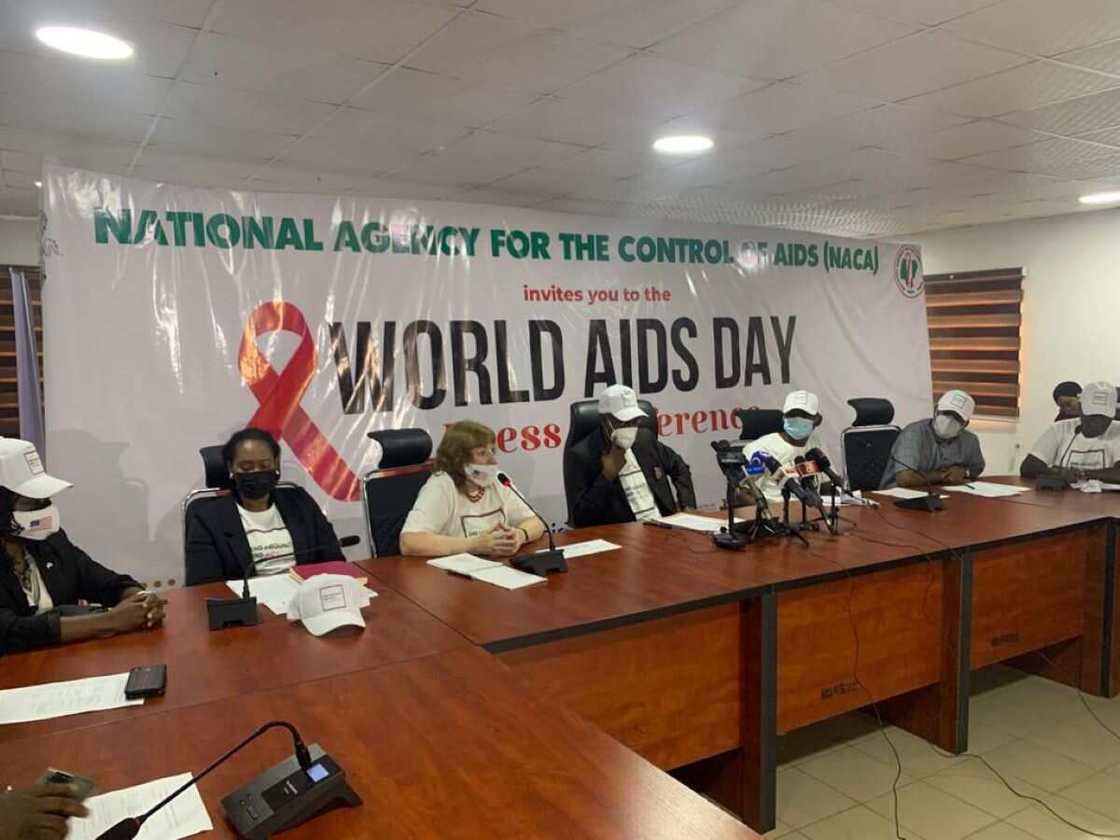HIV/AIDS: UN Highlights 1 Most Important Thing That Can End Spread of Disease
- As the fight against the spread of HIV/AIDS continues globally, Nigeria has been urged to do all it takes to end inequality among persons living with the virus
- The call was made by the country director of the Joint United Nations Programme on HIV/AIDS (UNAIDS), Erasmus Morah
- Morah said Nigeria must not rest its oars in the effort to prevent the transmission of HIV from mothers to their newborns
PAY ATTENTION: Click “See First” under the “Following” tab to see Legit.ng News on your Facebook News Feed!
The Joint United Nations Programme on HIV/AIDS (UNAIDS) has said that there is an urgent need to tackle the long-standing inequalities existing in the accessment of HIV treatment commodities among people living with the virus.
The country director of UNAIDS, Erasmus Morah, said this while speaking at the press conference organised by the National Agency for the Control of AIDSS (NACA) in Abuja on Wednesday, November 24.

Source: Facebook
The conference attended by Legit.ng reporter was in commemoration of the 2021 World AIDS Day themed, "End Inequalities, End AIDS Through Sustainable HIV Financing in Nigeria."
Morah said while the dreaded inequality has only increased, tackling inequality is key to ending HIV/AIDS among key populations living with the virus.
PAY ATTENTION: Install our latest app for Android, read best news on Nigeria’s #1 news app
Commending Nigeria's effort in being party to the promise made at the June 2021 UN General Assembly High-Level meeting in New York, Morah said the country has put a befitting spin to the global theme for WAD.
Nigeria is the biggest producer of HIV positive babies
Further speaking on the prevention of mother-to-child transmission of HIV/AIDS, Morah described Nigeria as the largest producer of HIV positive babies.
He said one in seven babies testing positive for HIV is alarming and needs to be tackled with all available resources.
Urging the media to take the centre stage in asking the right questions about preventing mother-to-child transmission of the disease, the UNAIDS country director said there is a need to ensure that HIV commodities reach the most neglected population.
Morah said:
"To end this, our question should be who is not on the bus, who doesn't have access to HIV commodities, treatment and prevention services."
Progress recorded by Nigeria in curbing the spread of HIV
In his address, the director-general of NACA, Aliyu Gambo, Nigeria has recorded significant progress in its war against HIV/AIDS.
Gambo said a recalibration of the HIV epidemic showed a significant decline in HIV prevalence from 5.8 in 2001 to 1.3 in 2018.
He also said that it is presently estimated that 1.8 million people living with HIV in Nigeria of which 90% are aware of their HIV status, 96% are on treatment and 84% are virally suppressed.
The NACA DG said:
"Despite the negative impact of the lockdown instituted as a public health measure to curb the spread of COVID-19 across the world, the HIV programme in Nigeria proved resilient with an increase in the number of people placed on treatment."
He added that various activities including a road walk, Jumat prayer and thanksgiving services, adolescent and young person events including debate among schools, HIV testing services and many others have been outlined to commemorate the 2021 WAD.
Gambo called on the stakeholders in the national response of HIV to ensure they play their roles in epidemic control and sustainability.
He said:
"So, interventions must be targeted at these population groups ensuring that evidences drives programme."
"Conscious effort must be made to address these emerging dynamics if we are to achieve epidemic control and sustain it."
NEPWHAN speaks on ending mother-to-child transmission of HIV
Also speaking, the national coordinator of the Network of People Living with HIV/AIDS in Nigeria (NEPWHAN), Abdulkadir Ibrahim, commended the NACA DG on the agency's effort to curb the spread of the disease.
Ibrahim said has over time shown that he is more than capable to handle the responsibilities saddled on him.
He said:
"This is coming from the mouth and heart of the people living with HIV, having over 1.6 million people on HIV treatment in the country despite the impact and challenges that came with the COVID-19 pandemic is an amazing thing to do."
Currently, there are 1,629,427 people on treatment. Out of which 57,280 are children between the ages of zero and 14 years; 551,106 are adult males from 15 years and above and 1,021,041 are adult females from ages 15 years and above.
He also called for more questions to be raised on those who are missing out on the treatment rather than those who are able to access HIV commodities.
Referring back to the theme of the 2021 World AIDS Day, Ibrahim called for strategic ways to close the inequality gap between those on treatment and the population who are being missed out or neglected.
Ibrahim said:
"Nigeria is still recording babies born with HIV and we must change that. Again we must design programs and activities that address this issue of babies born with HIV and find ways to prevent mother-to-child transmission."
"For instance, we have mentor mothers but what about the fathers who also are the ones that allow our mothers to visit the facilities. I think we need to factor in the importance of having mentor fathers too, if we must make a head way in this."
Statistics of babies born HIV positive in Nigeria
Meanwhile, Legit.ng previously reported that a report from the National AIDS and STIs Control Programme showed that 490 babies tested positive for HIV in 2020.
Details of the report showed that in 2020; 27,909 infant DNA samples were tested, 19,715 were tested and 409 babies results came out positive and in 2019; 26,247 infant DNA samples were collected, 19,947 were tested and 833 were positive.
It was also gathered that a large number of these babies contracted the virus mostly because their mothers failed to access facilities for antenatal care and ended up either delivering at home or other birthing locations.
How HIV/AIDS can affect a child's development process
In addition, a pediatric consultant had said that HIV infection when left untreated in children can lead to encephalopathy and in turn slow down the process of development in the child affected.
Dr Atana Ewa said health workers have the responsibility to ensure to every pregnant woman is tested during ANC.
According to the medical doctor, the testing should also go beyond breastfeeding and continued even after the infant has been weaned.
Source: Legit.ng


